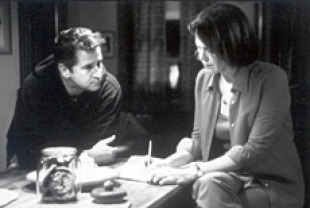Rachel Naomi Remen writes in Kitchen Table Wisdom: "Everybody is a story. When I was a child, people sat around kitchen tables and told their stories. We don't do that much anymore. Sitting around the table telling stories is not just a way of passing time. It is the way wisdom gets passed along. The stuff that makes life worth remembering. Despite the awesome powers of technology many of us still do not live very well. We may need to listen to each other's stories once again."
Take a seat at Anne Nelson's kitchen table and listen to her story about some heroic men who died on September 11 in New York City. In the l980s, Nelson reported on the wars in El Salvador and Guatemala at the height of the death squad period. Back in the States, she worked with the Committee to Protect Journalists. Since 1995, she has directed the Columbia University Graduate School of Journalism's international program.
Like many in the city, Nelson felt numb after the terrorist attacks of September 11. Then she was introduced to a New York Fire Department captain who needed help writing the eulogies for his men who were missing in the debris of the World Trade Center. Nelson wrote a play about her experiences, and it has been staged in New York, Los Angeles, and Dublin. That drama has been made into a film directed by Jim Simpson.
Joan (Sigourney Weaver) is a journalist who lives with her family on Manhattan's Upper West Side. She is at a loss on how to handle the many feelings she has about the tragic events of September 11. Then Nick (Anthony LaPaglia ), a fire captain, asks for her help as he prepares to speak at the memorial services for four of his men. Still in mourning and feeling guilty for having survived when they died, he feels that he is unequal to the challenge of paying tribute to them.
So these two individuals from very different worlds sit down together to work on a sacred task. In her sister's Park Slope home, Joan asks Nick to give his impressions of each man. He begins with Bill, a quiet Irish Catholic, a born leader whom the younger men looked up to. Slowly answering her questions, he pinpoints details from Bill's life and work. Then, with a fluid grace and ease, Joan assembles his comments into a fine tribute to the man. It's short, substantive, and totally recognizable. Nick is taken aback by her skills with language, but she humbly replies, "They're your words, I just put them in order."
Next is Jimmy, a new guy still on probation, twenty-two years old. September 11 was his first big fire. Nick then talks at length about Patrick, his best friend, forty-seven years old with a family of four, a man of purpose whether at work, at home, or at church. While reading Nick the tribute to Patrick, Joan breaks down in tears. She tells him of her recent attendance at a wedding which was "a dream intermission in all of this." Then, he surprises her with the revelation that he is taking dancing lessons. This moment of intimacy enables them to briefly take a break from the grieving process which now knits them together into a community of two.
The final eulogy is for Barney, a jokester who always had the men in stitches. He was also a welder who left remnants of his craft in the firehouse. In last scene of the film, Nick is shown delivering the tribute to this young man with his parents and others in attendance. Standing at the back of the church, Joan listens to the speech she helped create.
In a vivid and memorable way, The Guys reveals how important our special gifts can be when put in service of of others. It also shows how deeply felt emotions can draw people together across the walls that might otherwise separate them. Perhaps the most poignant line in the drama is one by Joan: "We have no idea what wonders lie hidden within the people around us." After experiencing this healing movie, you'll know in your heart just what she means.
